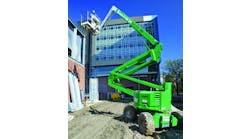So is there anything good to report?
We start off our annual RER 100 issue — usually a showcase for how the rental industry is growing and booming, how rental is increasingly the best way to utilize equipment, transforming the fabric of the construction industry, with record volume numbers almost every year — with a cover proclaiming that “the perfect storm” has hit the RER 100.
You can go on to our listings and see the total chart has dropped 25.3 percent year over year with the top 10 dropping 26.3 percent. United Rentals comes in below $2 billion in rental volume for the first time since the 1990s. You can go down the list and see solid well-managed fast-growing companies coming in with 25- or 30- or 35-percent rental volume declines and if a company's rental volume only dropped 10 percent or less it's as though they just won an Academy Award or a Gold Medal in the Olympics.
You can read about companies closing branches, laying off 25 percent of their employees, dumping their used equipment for dramatically deflated prices, renting equipment for rates that don't even cover payments, and aging their fleet from 36 months to 39 months to 42 months, with all the additional maintenance expenses that implies.
For most companies, the first quarter of 2010 was worse than last year and many RER 100 executives say they don't know when it will get better, maybe later this year, maybe 2011 or even 2012. Obviously the commercial construction market shows little sign of recovery, housing construction continues nearly non-existent in many markets, and credit is scarce and restrictive.
One interesting perspective comes from Gerry Plescia, president of Hertz Equipment Rental Corp. While the first quarter of 2010 was a decrease for HERC as well, Plescia saw a hopeful trajectory. For HERC, Plescia said, the winter of 2008-09 was more difficult, even though the weather was not as severe as this year's winter. Coming out of the holidays at the beginning of 2009, business started dropping, and each month declined as the year progressed. Many rental companies saw the same pattern: a steady decline, almost a free fall, as projects finished up and no new projects took their places, as phone calls and bids and orders slowed to a trickle.
But, Plescia noticed, coming out of the holidays in 2010, business seemed to pick up month after month. His expectation, based on a number of factors, is that that pattern will continue throughout the year and that in the second half of 2010, volume will begin to increase compared with 2009. A few others I spoke or e-mailed with over the past couple of weeks have said similar things — more inquiries, more quoting, more possible jobs.
Equally significant, many companies say they are running more efficiently than in the past, forced by the recession to find less costly and more effective systems. As Dan Tumminello of Midwest Aerials & Equipment says, his company took the time to look at inefficiencies that were covered up because in recent years they were too busy to look at them. It was a painful process of learning, but hopefully it will lead to better things. Many companies have embraced new technologies to enhance efficiencies.
It's been a sad year in that a lot of good people left this industry because they lost their jobs and couldn't find new ones because nobody was hiring. Several RER 100 executives told me some really great people came to them looking for jobs but they had no positions for them. It's a cycle we've seen before. When times are good, it's so hard to find trustworthy talented people, and then when times are tough we have to let them go and then when we need them again, they've gone on to other things, forced by necessity to find new jobs in other fields.
Quite a few RER 100 executives talked about the “insanity” of current rate wars and the horribly low rates they hear being quoted, and many have admitted renting at ridiculous rates just so they could compete and not lose a good customer. Plescia, and several others, expressed that they felt the floor had been reached and rates were beginning to show some signs of sanity. It's bound to happen sooner or later, right?
There's been an interesting shift by many companies, again by necessity, away from construction contractors, towards municipalities, government contracts, road work, bridge work, environmental projects and other areas. Obviously when commercial and residential construction picks back up, rental companies will gravitate towards it, but hopefully some of the new areas people have explored will expand the usual boundaries of the rental market.





